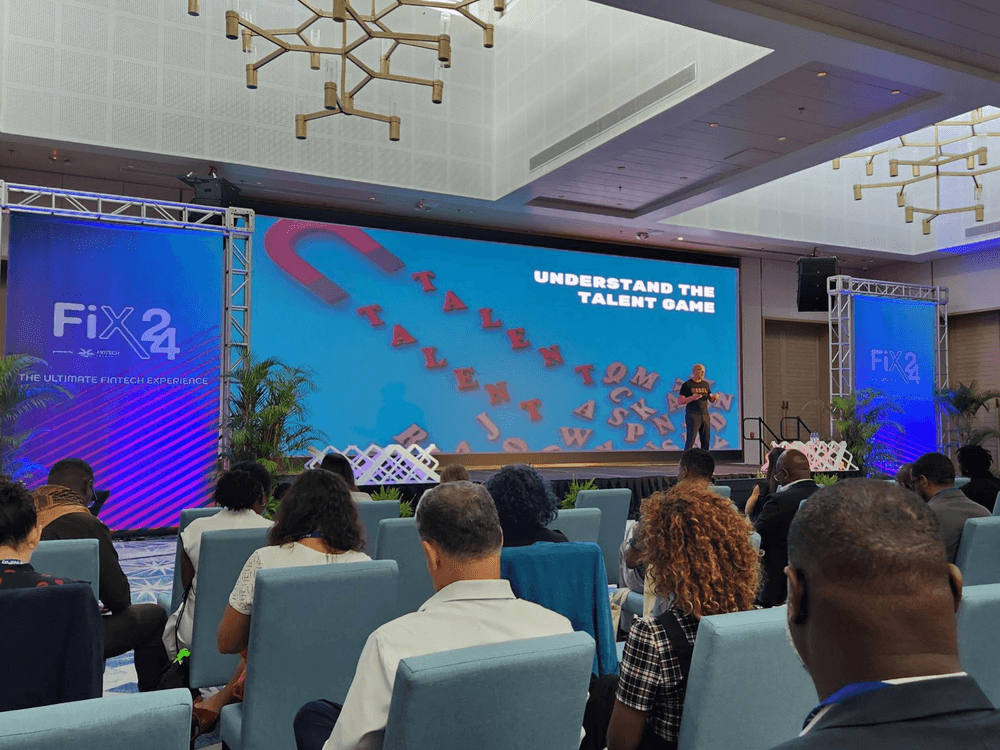Last week, I had the opportunity to step out of the confines of the office and immerse myself in the dynamic world of financial technology at Fintech Islands. Hosted at the magnificent Wyndham Grand Barbados Sam Lords Castle, this event served as a beacon for thought leaders, innovators, and enthusiasts alike, converging to explore the ever-evolving landscape of fintech.
At Fintech Islands, the discourse spanned across several captivating tracks, each delving into the realms of innovation, sustainability, and inclusivity within the financial sector.
Session covered themes such as Artificial intelligence (AI) and how it’s transforming the financial sector, offering solutions from ChatGPT to combat cybercrime. Further the ethical considerations that must accompany its implementation to ensure responsible integration into financial services.
Redefining access to financial services was another area, delving into the emergence of mobile-first banking solutions that are reshaping how individuals, especially the unbanked and underbanked, access financial services. This revolution is highlighting the importance of inclusivity and accessibility in banking innovations.
Critical for the advancement of the sector is how central banks are embracing digital transformation, driven by advancements in technology and the rise of digital payments. The introduction of Central Bank Digital Currencies (CBDCs) is aiming to enhance financial efficiency and inclusion, ensuring that all individuals benefit from the digital age. And the proliferation of cryptocurrency, real-time solutions, and social networks is redefining digital payments, emphasizing convenience, security, and inclusivity in financial transactions. As innovations continue, prioritizing consumer needs and preferences remains essential for the seamless adoption of digital payment solutions.
Of particular interest to me was the session on climate fintech and how Fintech-powered solutions are crucial in financing the energy transition and enhancing resilience to climate change. By leveraging fintech, communities vulnerable to environmental threats can fortify their sustainability efforts.
Key moments included Diego Szteinhendler’s (SVP, Fintech & Enablers, Latin America and the Caribbean Mastercard) insights on fintech trends, Alfonso Garcia Mora’s (Regional Vice President International Finance Corporation, The World Bank Group) advocacy for inclusive development, and Martin Kwame Awagah’s (Board Member Africa Fintech Network) exploration of fintech’s role in African financial inclusion.
The panel discussion on “Banking on a Sustainable Path,” featuring esteemed leaders such as Chad Blackman (Minister of Economic Affairs & Investment Government of Barbados), David Griffiths (Associate Partner IBM Consulting), Anthony Clerk (Managing Director & CEO, Republic Bank (Barbados) Limited) and our Executive Director – Deodat Maharaj, provided a comprehensive overview of the challenges and opportunities in climate finance and mitigation.
From forging innovative partnerships to fostering educational reform, the discourse underscored the imperative of collective action in achieving sustainable development goals and fostering a resilient financial ecosystem.
As we reflect on the insights gleaned from Fintech Islands, one truth remains abundantly clear: the future of finance is not merely a destination but a journey—one defined by innovation, inclusivity, and sustainability. Let us embark on this voyage together, charting a course towards a brighter, more prosperous tomorrow in the true spirit of SDG 17 – Partnerships for the Goals.






